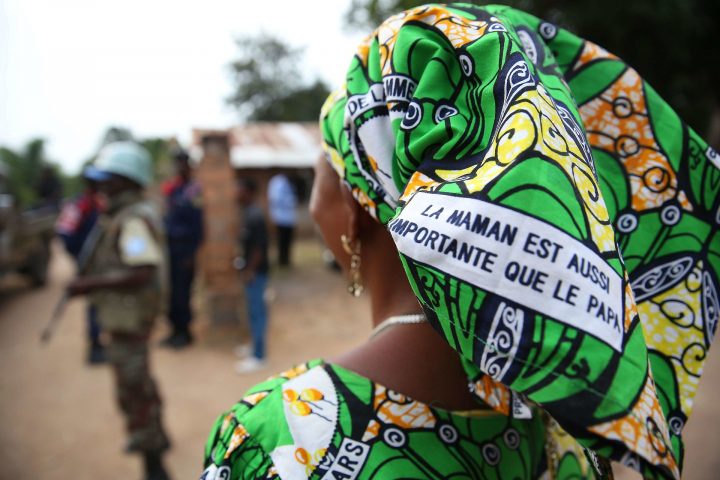Women in Zimbabwe’s informal economy face steep challenges amid economic crisis, competition from big companies, and poor infrastructure.
It was late afternoon in Harare, Zimbabwe, and Rudo Kabete, 35, sat beside more than 50 other women selling almost identical handicrafts products. She had given up all hope of making any sale that day.
When a white woman entered the hot, overcrowded market room in the centre of the city, Kabete rushed over to her, grabbing her by the hand and taking her to her table.
“I have the best quality for you, madam; these African prints outfits, wooden-made animals, wooden bowls and African necklaces and bracelets, are all for you”, she said, registering her first sale in three months.
Kabete started her business to support her family. As the general secretary for a cooperative called Lugwasyano (Tonga for ‘assisting each other’), she encourages women to work together rather than compete in selling their produce.
Formed in 1987 in a western town called Victoria Falls, the cooperative now comprises more than 100 women who sell handicrafts in the local informal economy.
“We came together after realising that as women we were suffering in the hands of our husbands and facing the same plight”, Kabete told me. “Our husbands, after having been paid their wages or salaries could not bring any cent home, and when you ask, you got beaten up”.
Zimbabwe’s economic meltdown, with rising inflation and high unemployment, has brought many of the Lugwasyano women’s businesses to their knees. They struggle to compete with well-established, big companies, Kabete tells me, which have easier access to markets – and better infrastructure.
In contrast, Lugwasyano women have to sell their products in cramped, uncomfortable conditions, making it difficult to sit still all day and attract customers.
“They struggle to compete with well-established, big companies, which have easier access to markets — and better infrastructure”
The Lugwasyano women are not alone – the situation is echoed across other African countries. More than 90% of women employed in Africa are in the informal sector, which means they are self-employed in small unregistered enterprises, typically lacking in formal rights’ protections and decent working conditions, and often facing poverty.
It is for this reason that global women’s rights movement recognise that in order to achieve full economic empowerment, women need control over economic resources and access to decent work – as well as quality gender-sensitive infrastructure.
In fact, the theme of this year’s UN Commission on the Status of Women (CSW), which took place between 11-22 March this year, included a focus on sustainable infrastructure for gender equality.
An expert report published in 2018 ahead of CSW highlighted the need for the international community to better understand the nature of the informal economy.
Women in Africa, it said, “trade within and in front of homes, by the roadside, in parks, schools, and the middle of busy central business districts, either in/on fixed or mobile containers and display units”.
African cities should therefore be designed to accommodate women’s informal trade. The “present inadequacy” of houses, streets, markets, water, electricity, refuse and toilets reduces the productivity and profitability of these women’s businesses.
Infrastructure development is on the agenda for many African countries, particularly through the role of the African Union which seeks to strengthen transport, energy, water and technology sectors across the continent.
And yet, many infrastructure projects and programmes are ‘gender blind’ – meaning that those building new infrastructure fail to take into account the needs and experiences of women, which perpetuates women’s narrow roles in the unpaid and informal sectors.
Isabella Ndolo, a women’s rights activist from Kenya told me how women are the “drivers” and “backbone” of communities throughout Africa, but they are sidelined when it comes to discussions about what infrastructure is needed and where.
Women are the “drivers” and “backbone” of communities throughout Africa, but they are sidelined when it comes to discussions about what infrastructure is needed and where
Women are also rarely employed in the male-dominated infrastructure development sector due to rigid perceptions of gender roles. “We need to target our young girls for training and capacity building particularly through leveraging on our technical training institutions available in most African countries,” Ndolo said.
Cheikh Beda, director of infrastructure and energy at the African Union (AU) Commission, told me that they are starting to actively involve more women in their infrastructure projects.
“The involvement of women is non-negotiable especially from the concept, selection of programmes up to implementation, and operationalising of the projects”, he said.
“We intend to engage in huge campaigns of sensitisation across the continent to bring women in – but women have to show up more”, he added.
In Burundi, Catherine Sommer works at an agency that manages World Bank infrastructure development projects. She also said that “women have to be louder at all levels, organise themselves to ensure they benefit from” these projects.
“We have to be proactive – showing we exist, that we are there and that we are always included particularly on matters that affects us too,” she told me.
That’s precisely what the Lugwasyano women are doing. Kabete described how they work together to “develop ourselves and our communities” to “meet our needs” in the absence of support from big business and the Zimbabwean government.
The political will appears to be there from the AU to CSW. But these leaders need to listen to the real infrastructure needs of African women working in the informal sector. Only then, the Lugwasyano women’s enterprises might be able to thrive.
*This article is part of a series on women’s rights and economic justice from 50.50 and AWID, featuring stories on the impacts of extractive industries and corporate power, and the importance of tax justice for the rights of women, trans and gender non-conforming people.






